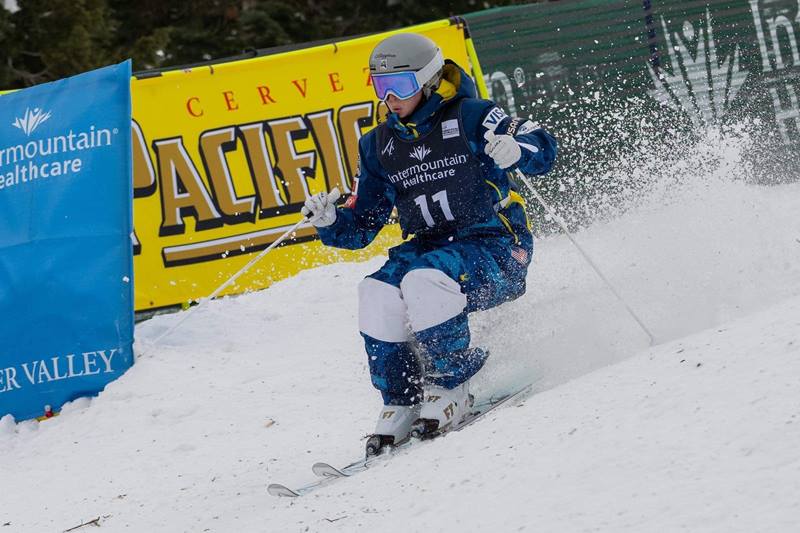Use Intermountain Connect Care®
Learn More.
How can we help?

A unique collaboration between Intermountain Healthcare and U.S. Ski & Snowboard has led to new sports science techniques that aim to give athletes every possible competitive advantage as they head to the Winter Olympics Games.
Whether an athlete is recovering from an injury or trying to improve their performance, these new best practices – developed and designed in the high-tech sports science lab at Intermountain TOSH–The Orthopedic Specialty Hospital in Murray – are helping winter sports athletes get to the top of their game before the Olympic Winter Games in Beijing.
“I’ve presented about our collaboration to people from around the world, and no one is doing anything close to this,” said Josh Bullock, athletic development coordinator for U.S. Ski & Snowboard. “By combining movement data with targeted training prescriptions and explicit coaching, we’re helping athletes avoid injuries, return from injury quicker with a greater success rate and improve performance.”
This three-year partnership uses Intermountain TOSH’s state of the art sports science lab to test an athlete’s movement and identify where weak points or issues exist. Sports medicine staff at TOSH and U.S. Ski & Snowboard athletic development coaches then use that data to design a plan to enhance the athletes’ capabilities for high-level performance.
Bill McDermott, PhD, clinical biomechanist at Intermountain TOSH, says the partnership is helping Intermountain find new ways to implement training programs for top-tier athletes, as well as regular patients recovering from injuries.
“Our return to sport model consists of state-of-the-art biomechanical and strength assessments and provides regular feedback about an athlete to our physicians, therapists, and trainers,” said McDermott. “During this partnership we’ve expanded our testing and training of athletes to ensure they’re not only ready to return to sport safely, but they’re also at their peak level of competing.”
The lab uses high speed 3D motion capture, sensors attached to an athlete’s body, and force sensors in the floor to analyze their movement. While doing a series of exercises the highly sensitive cameras track how the body moves and sees deficiencies not visible to the eye.
One of those athletes is Hannah Soar, a US women’s mogul skier who will be competing in the Winter Olympics next week. She recovered from an ankle injury four years ago, and says the integrated process of world class evaluation and coaching was a way to make sure she could keep improving.
“After my first evaluation, the sport science team at TOSH discovered I was favoring one side and didn’t know it. This is the first year I haven’t felt any residual effects from that injury,” said Soar. “Seeing the huge amount of data combined with new training ensures my body is working efficiently, because in this sport winners are decided by milliseconds.”
In the past, Soar says testing for deficiencies was an intense process that didn’t always provide immediate answers to what was wrong. Using the sports science lab at TOSH has made testing the body easier and the results give a clearer picture of deficiencies.
In Soar’s case, TOSH sport science specialists discovered her left leg was slightly weaker and certain muscles weren’t firing right. Her athletic development coaches at U.S. Ski & Snowboard used the information to design workouts specific to her needs.
“In the past many of our workouts were more team oriented, but our coaches have designed these personalized plans which have been invaluable to our preparation,” she noted.
McDermott says these types of advances in sports science are changing the way athletes prepare for competitions. The goal is to prevent injuries in the first place or help athletes recover faster if they are sidelined.
###
About Intermountain Healthcare - Located in Utah, Idaho, and Nevada, Intermountain Healthcare is a nonprofit system of 25 hospitals, 225 clinics, the Intermountain Medical Group with some 2,700 employed physicians and advanced care practitioners, a health plans division called SelectHealth, Homecare, and other health services. Helping people live the healthiest lives possible, Intermountain is committed to improving community health and is widely recognized as a leader in transforming healthcare by using evidence-based best practices to consistently deliver high-quality outcomes and sustainable costs.
About U.S. Ski & Snowboard - U.S. Ski & Snowboard is the Olympic National Governing Body (NGB) of ski and snowboard sports in the USA, based in Park City, Utah. Tracing its roots directly back to 1905, the organization represents nearly 200 elite skiers and snowboarders in 2021, competing in seven teams; alpine, cross country, freeski, freestyle, snowboard, nordic combined and ski jumping. In addition to the elite teams, U.S. Ski & Snowboard also provides leadership and direction for tens of thousands of young skiers and snowboarders across the USA, encouraging and supporting them in achieving excellence. By empowering national teams, clubs, coaches, parents, officials, volunteers and fans, U.S. Ski & Snowboard is committed to the progression of its sports, athlete success and the value of team. For more information, visit U.S. Ski & Snowboard.
This partnership uses TOSH’s sports science lab data to design a plan to enhance athletes’ capabilities.